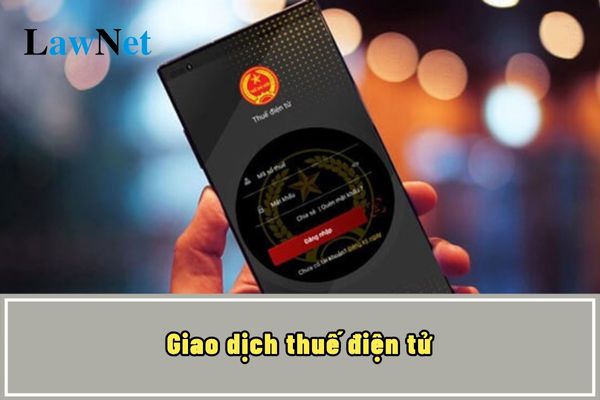What are regulations on e-transactions in taxation between taxpayers and tax authorities in Vietnam?
What are regulations on e-transactions in taxation between taxpayers and tax authorities in Vietnam?
According to Clause 1, Article 1 of Circular 19/2021/TT-BTC, transactions in the field of taxation between taxpayers and tax authorities through the following e-methods:
[1] Taxpayers carry out tax administrative procedures as prescribed by the Law on Tax Administration, including: taxpayer registration; tax declaration; tax payment; confirmation of tax obligation fulfillment; reviewing tax payment information; procedures for offsetting tax payment, late payment interest, penalties for overpayment; tax refund; tax exemption, reduction; exemption from late payment interest; non-calculation of late payment interest; suspension of overdue tax amount; write-off of tax debt, late payment interest, penalties; extension of tax payment; installment payment of overdue tax debt; and other dossiers, documents.
[2] The tax authority sends notifications, decisions, and other documents as prescribed by the Law on Tax Administration to taxpayers.
[3] The tax authority provides support services to taxpayers, including: lookup of taxpayer information; lookup of dependent information; lookup of tax obligations; provision of information to taxpayers; receipt and resolution of taxpayer inquiries, and other support services.
[4] e-transactions between tax authorities and authorized state management agencies, and related organizations in receiving, providing information and resolving tax administrative procedures for taxpayers as prescribed by the Law on Tax Administration and the one-stop interlinked mechanism.
[5] Procedures and processes for connecting the portal of the General Department of Taxation with the information exchange system of the e-transaction value-added service provider in the tax field; conducting e-transactions in the field of taxation through the e-transaction value-added service provider in the tax field.
[6] Supply and exchange of information for coordination work via e-methods between tax authorities and state agencies, organizations, and individuals related to the receipt and resolution of tax administrative procedures for taxpayers.

What are regulations on e-transactions in taxation between taxpayers and tax authorities in Vietnam? (Image from the Internet)
Do taxpayers have an email address for e-tax transactions in Vietnam?
According to Article 4 of Circular 19/2021/TT-BTC regarding principles of e-tax transactions as follows:
Principles of e-Tax Transactions
1. Taxpayers conducting e-tax transactions must have access to and be able to use the Internet, have an email address, have a digital signature as prescribed in Article 7 of this Circular or have a mobile phone number provided by a telecommunications company in Vietnam (for individuals not yet provided with a digital certificate) registered for use in transactions with tax authorities unless the taxpayer selects e-tax payment methods according to point đ, clause 2 of this Article as regulated by the bank or intermediary payment service provider.
2. Taxpayers can choose the following methods for conducting e-tax transactions through:
a) The e-portal of the General Department of Taxation.
b) The National Public Service Portal, the e-portal of the Ministry of Finance connected with the e-portal of the General Department of Taxation.
c) The e-portal of other authorized state agencies (except point b of this clause) connected with the e-portal of the General Department of Taxation.
d) The T-VAN service provider organization accepted by the General Department of Taxation connected with the e-portal of the General Department of Taxation.
đ) e-payment services of banks or intermediary payment service providers to conduct e-tax payment.
...
Thus, according to the principles, taxpayers engaging in e-tax transactions will need to have an email address.
When shall taxpayers handle technical issues themselves during e-tax transactions in Vietnam?
Based on Article 9 of Circular 19/2021/TT-BTC concerning principles of e-tax transactions as follows:
Handling Technical Issues in the Process of e-Tax Transactions
1. In cases where e-transactions cannot be performed due to technical infrastructure errors of the taxpayer, the taxpayer must handle the issue themselves.
In the event that the tax dossier submission date is due, and the taxpayer's technical infrastructure system has not resolved the issue, the taxpayer can conduct transactions with the tax authority by submitting paper documents directly at the tax office or via post, or by paying taxes directly at the bank or the State Treasury as prescribed in Decree No. 11/2020/ND-CP and guiding documents.
...
Therefore, according to the above regulation, if e-transactions cannot be performed due to the taxpayer's technical infrastructure errors, the taxpayer must handle the issue themselves.

